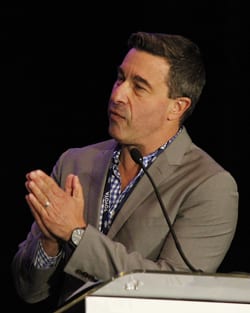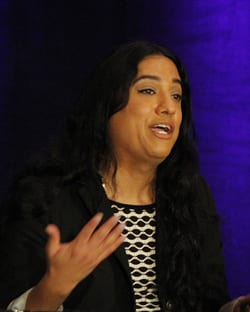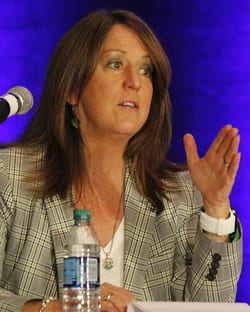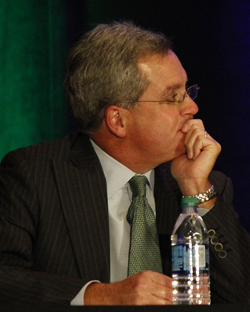Today from San Francisco: What happens next in LGBT civil rights?
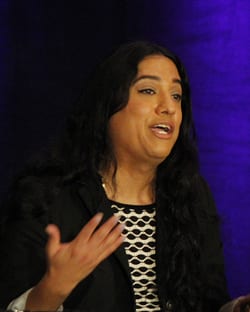
Hi there. It’s me again, checking in from the National Gay and Lesbian Journalist Association conference in San Francisco. I just wanted to share a little bit of what was talked about in today’s morning plenary session, titled: Life After Marriage: What’s Next.
Scott Shafer, host of “The California Report” on KQED Public Radio, moderated the discussion that included as panelists National Center for Lesbian Rights ExecutiveDirector Kate Kendall, San Francisco City Attorney Dennis Herrrera and Isa Noyola, program manager with the Transgender Law Center.
Unfortunately, the plenary — scheduled to be an hour and 15 minutes long — got off to a late start and so lasted less than an hour. That meant that a lot of relevant topics were left undiscussed. The fact that the first several minutes were taken up talking about a marriage equality issue — Kim Davis in Rowen County, Ky. — also cut short the time spent on what comes next.
But the discussion that did take place on where we, as an LGBT rights movement, go from here was informative, to say the least.
The most important discussion, I think, centered on the T in our LGBT community: The LGB parts of our community cannot get so flush with excitement and satisfaction over winning the marriage equality battle — not counting, of course, holdouts like Kim Davis and the inevitable rash of “religious freedom” bills we are likely to see in state legislatures and probably Congress, too — cannot just walk away and leave our transgender brothers and sisters in the dust of our success.
Noyola began her remarks by reading the names of the 18 trans women murdered so far this year in the U.S., helping drive home her point that while society may be changing when it comes to sexual orientation, the inequalities and injustices are still strong, violent and deadly when it comes to issues of gender identity.
Reading those names, Noyola said, :helps me ground myself and brings us to the heart of the situation our trans communities are facing. … The trans communities have had to swallow a bitter pill for years around our rights and our place in [LGBT] communities.”
Noyola, Kendall andHerrera all warned that trans people remain the most marginalized and endangered segment of our LGBT communities as a whole. And something I read in the “Street Sheet” newspaper, a publication of the Coalition on Homelessness, served to underscore even more strongly that transgender people are lagging far behind the rest of the community in terms of rights and protections.
According to the newspaper, which based some of its article on results of a recent National Transgender Discrimination Survey, trans people are homeless at a higher right, especially trans women of color, and trans people are about 4 times more likely to have a household income below $10,000 annually. And a separte study showed that one in five California transgender people experienced homelessness after identifying as transgender.
Trans people have a harder time finding jobs because of anti-trans bias. They are targeted more often for violence. And they are an easy target for politicians pandering to right-wing conservatives who want somebody to blame for whatever is bothering them at the moment.
As a result, so called “bathroom bills” have become all the rage. We saw more than a few of them in Texas during the last legislative session, and now opponents of Houston’s Equal Rights Ordinance are breaking out the “men in the women’s restrooms” boogey-man to try and defeat HERO at the polls in November.
Even here in oh-so-liberal California, the threat of a bathroom bill is raising its ugly head.
The key to victory, Kendall said, is education, and, all three panelists agreed, not leaving our transgender brothers and sisters behind. We as LGB people have got to fight as hard for the rights of transgender people as we fought for marriage equality.
The other main “what’s next” topic was the revamped version of the old “Employment Non-Discrimination Act.” Now known as The Equality Act, this piece of legislation would ban anti-LGBT discrimination not just in employment, but also in public accommodations, housing, credit and other areas.
Kendall said that House Minority Leader Nancy Pelosi, who represents California’s 12th District in Congress, recently told supports of the Equality Act that the bill’s chances in the Republican-dominated Congress, as it stands now, are slim. But just introducing and pushing the measure now will help build the framework necessary to get protections enacted at the state level in the more than 30 states where anti-LGBT discrimination is still legal (including Texas).
Kendall stressed that the Equality Act definitely does include protections based on gender identity and gender expression, unlike ENDA, which at times in its history has been notorious for excluding transgender protections.
There are other issues that will be moving to the frontburner now that marriage equality is the law of the land. Things like LGBT families, adoption, immigration, LGBT prisoners, and more. But perhaps the best place to start is with the Equality Act and definitely by remembering to never leave the T behind.



